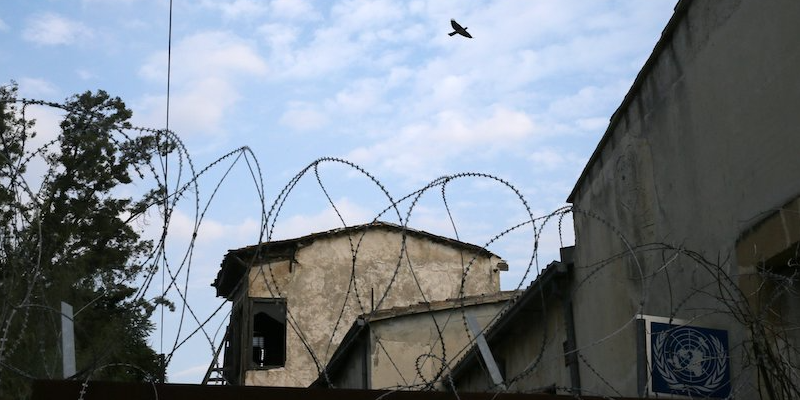
Can Cyprus, ‘Graveyard of Diplomats,’ Beat the Odds?
My Turkish-speaking community has been denied international representation for too long. I hope to change that.

The art of diplomacy has been around for thousands of years — perhaps since the dawn of civilization — and has supported key public policy initiatives throughout history. It has led to major international achievements, including institutions such as the European Union. For many, the sky’s the limit to what diplomacy can accomplish. But for me, as a Turkish-speaking Cypriot, having grown up in a country of political conflict, with a seemingly permanent diplomatic stalemate, those possibilities are more limited. Still, I hope to find a way to win international representation for my community, which has been denied it far too long.
As a system of structured communication between and among parties, diplomacy plays an integral role in foreign relations and has repeatedly proven its effectiveness in influencing the actions of governments and upholding national interests. In the absence of diplomacy, the world order as we know it would cease to exist.
A troubled paradise to many of us, the Mediterranean island of Cyprus is often referred to as a “graveyard of diplomats.” Since its independence from Britain in 1960, it has suffered war, invasion, division and displacement of hundreds of thousands of its people. In 1974, Turkey invaded in response to a military coup backed by Greece. Since then, the island has been divided into the Greek-speaking and internationally recognized Republic of Cyprus, which controls two-thirds in the south, and the Turkish Republic of Northern Cyprus, recognized only by Turkey.
Numerous diplomatic efforts at reconciliation have failed, including a prominent 2004 United Nations initiative sponsored by then-Secretary General Kofi Annan, although those negotiations did achieve some progress. The current situation has been described as “negative peace” — there is no active warfare, yet the two main communities are divided with a physical barrier and garnished with dozens of military bases. This frozen standoff seems the only plausible outcome.
As time passes, Cyprus moves farther away from a peace settlement, given its changing demographics — a young generation with no memory of a united island, including the descendants of migrants who came from Turkey after 1974 — as well as a dispute surrounding the 2018 discovery of natural gas on the island. Although there are ongoing negotiations — informal talks were held in Geneva earlier this year — the Greek-speaking Cypriots continue to hold the upper hand, given their international recognition and EU membership. The impact of the stalemate is more heavily felt by the Turkish Cypriots, who face embargoes that stunt any growth and leave their fate in Turkey’s hands. At present, there is an unspoken pessimistic outlook on the island, with unofficial acceptance that the north might eventually become a province of Turkey.
As a 24-year-old, I consider myself a part of the first generation of Cypriots not to have experienced war or displacement — and a united island. Having grown up with tales of violent battles and collective trauma, I joined peacebuilding programs at age 14. The first was a bicommunal theater camp called Crossroads, followed by U.S.- and EU-sponsored projects such as the Cyprus Friendship Program, Euroscola, Cyprus Youth Entrepreneurship and Leadership Program — and most recently, the Youth Champions for Peace and Environment, an initiative of the U.N. peacekeeping force in Cyprus (UNFICYP).
All these programmes taught me how to campaign and prepare the population on the island for peace. Although this is exactly what I hope to achieve through diplomacy, I also find it hard to believe it will actually happen.
The current structures make it extremely difficult for Turkish Cypriots to take on any roles in international organizations and voice their concerns. We are not U.N. members, and despite our EU citizenship, we are disadvantaged when it comes to working in the EU, as Turkish is not a recognized language of the EU. Our existence is embodied in a president whose election was heavily influenced by Turkish President Recep Tayyip Erdogan, and we are not allowed to make decisions for ourselves.
In this climate, my only option is to work directly with influential people and build grassroot support on both sides for a peace settlement, to influence the motives of the leaders and their decisions, and to prepare the population on the island to accept it.
On a preserved section of the Berlin Wall in the city’s eastern part, someone painted a quote attributed to the late Austrian poet Erich Fried. It reads: “He who wants the world to remain as it is, doesn’t want it to remain at all.” This is a motto I live by. We have to believe that Cyprus has the potential to change despite the odds. I hope to contribute to the work of activists, politicians and U.N. civil servants on the island, in the hope that we can turn our “graveyard of diplomats” into a garden of Eden.
Dogukan Kansu is an activist and former student at the Washington International Diplomatic Academy.
